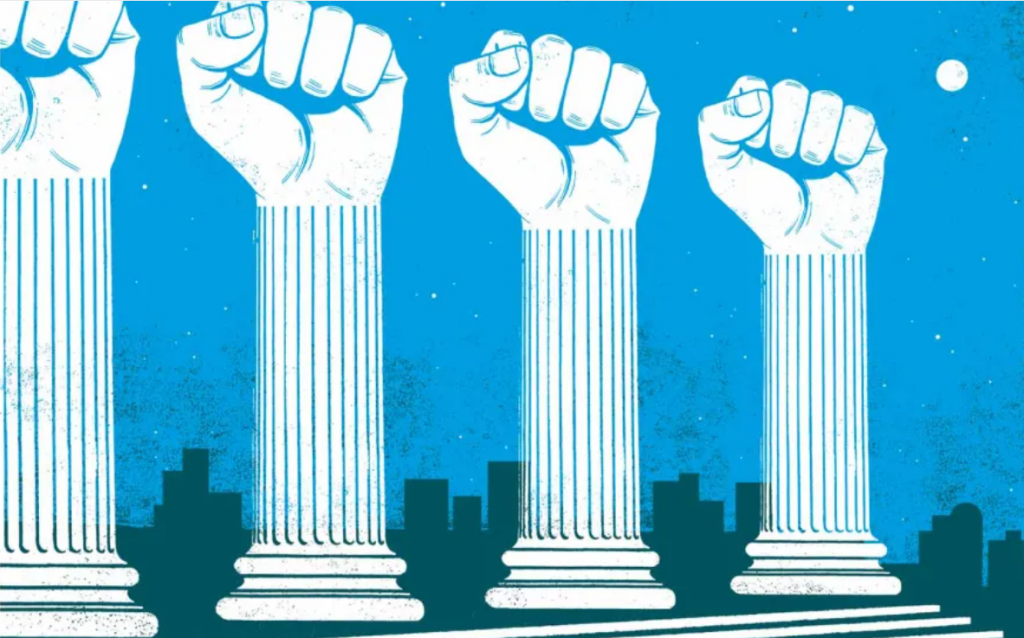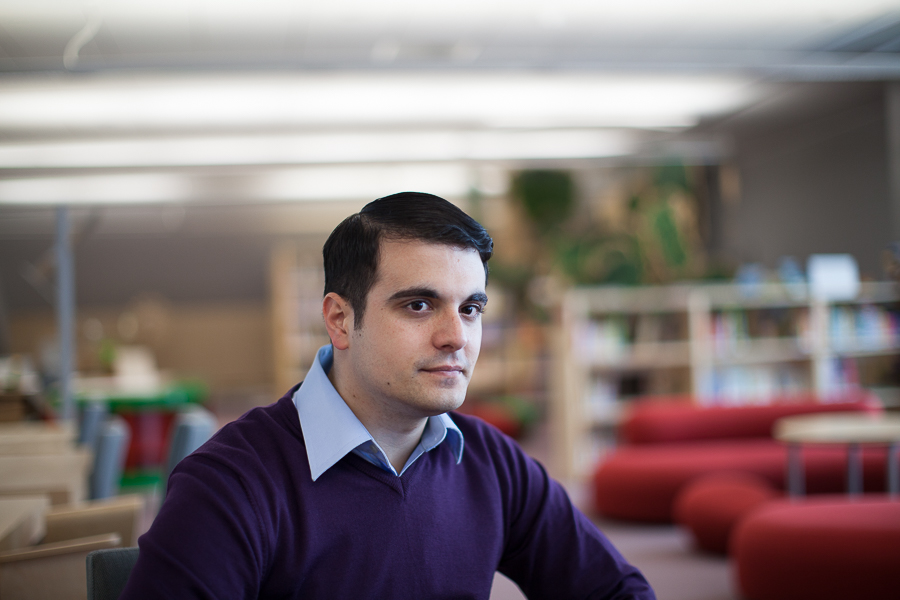Social entrepreneur Vladan Lausevic was recently the guest of the CEA Talk podcast. He talked about liquid democracy, the necessity of decentralized social media, the creation of a world parliament and how robotization and artificial intelligence could empower humans.
Host: Balázs Csekő
The idea came up in the late 1960s. James C. Miller wrote about the need of a new kind of democracy, a mixture of representative and direct democracy. He called it liquid democracy, where voters could delegate their votes to experts in different policy areas.
“It would be more efficient because it could mobilize a higher amount of knowledge and expertise”, Mr Lausevic says. “We could achieve a better decision-making by this system.”
The democratic systems we know today are a mixture of the Athenian direct democracy and the representative democracy that has become popular since the French and the American revolutions at the end of the 18th century.
However, democracy can be improved. One of the steps towards more democracy would be citizens voting on different topics in diverse policy areas. “This could happen daily, weekly, or monthly instead of voting every 4-5 years,” he argues.

Today, liquid democracy exists only in online-based communities, in certain networks and the Pirate Parties across Europe. “It’s still a sub-culture,” Mr Lausevic claims.
Modern technology can help digitalize and approve the current democratic system. The notion is not that voters go to the polling stations every week, but that they use their mobile phones and are able to delegate their votes to different individuals and organizations. “People should be able to make a difference even just by using their smart phones.”
The recent presidential elections in Uganda show, however, that there could be ups and downs on the way to a broader use of liquid democracy. Last January, during the elections, the government of Uganda ordered to shut down Internet traffic in order to avoid critical opinions to flow.
Decentralized digitalization
In the middle of a global digitalization process, citizens have to think about how to lay down the groundwork for democratic structures in the future. Decentralization could play a key role in that.
Liquid democracy goes hand in hand with technological and economic decentralization in a “more optimal” society as they are two sides of the same coin. “Liquid democracy is completely impossible without decentralization.”

“In the future, citizens should have access to decentralized internet, energy and pretty much everything,” Mr Lausevic assures. “The infrastructure should by controlled by individuals and communities, not by public institutions or governments.”
Digitalization does not necessarily have to be something negative. Robotization and artificial intelligence could empower humans. “There will be a big struggle between digital democracy and digital dictatorship like in China,” he says.
Role of nation states
Whether nation states can continue to play the same role as they have since the establishment of the first such entity in the 17th century remains to be seen. “There will always be a space for patriotism on different levels, some kind of federalism,” he claims.
Mr Lausevic is an advocate of the idea of a “world parliament”. Such an institution would not replace lower-level parliaments, but it could act similarly to the European Parliament.

Technologically, the notion of a world parliament is closer to humans “more than ever in our history.” It could exist already tomorrow as citizens can be digitally connected to the global level of governance, politics and democracy. “The social world is still missing: personal affections, ideas and belief,” he says.
Mr Lausevic estimates only 10-15%, a “small minority”, see themselves as global citizens. Social world and social reality are components that are inevitable for the world parliament to operate.
Social media: from good to bad
During the Arab Spring in the early 2010s, the general perception of social media was positive for democracy. Revolutions and protests in Egypt, Tunisia and Jordan were organized via social media platforms.
Ten years later, the other side of the coin is seen by the people. The general perception of social media is that it’s “bad for democracy as censorship is applied, populists and nationalists can navigate the platforms.”

“However, due to the complexity of the issue, social media is not bad for democracy,” Mr Lausevic argues. It makes easier for more people to participate in democratic conversations: citizens can get in touch with more people, write their opinions, and be in permanent contact with political parties.
“Twitter and Facebook will never be optimal for democratic conversation and decision-making as they are profit-generating companies,” he explains. The two companies are not created for digitalizing democracy in a “more optimal sense.”
The solution to this problem is not only decentralization but the non-profit nature of it. “Social media has to operate as a public good,” Mr Lausevic says. “Similarly to the Athenian democracy where the Agora was a public ground, not owned by a company, a single person or a small group of people.
Removing middle-hands
Decentralization means removing the middle-hands, like governments. Citizens can create their own solutions and institutions by true cooperation on the local level to solve everyday problems.
Representative democracy is not fit for the challenges of the 21st century. “Things have changed.”
“People try to cooperate if they see a park destroyed, or see the necessity of a school in a municipality, independently from their ideological beliefs,” Mr Lausevic claims.
The entrepreneur doesn’t share the view that governments will disappear completely. “You need police and judiciary; nevertheless, certain institutions could be removed.” The labor sector and transportation could be organized more locally, decentralized and peer-to-peer.
“If uniformity is the synonym for centralization, diversity is a synonym for decentralization,” he says.
Delegates
One of the cornerstones of liquid democracy are the delegates. Both individuals and organizations can play such a role. Delegates can also have liquid identities. “You can be conservative on one topic and liberal on another one.”
Citizens can be multi-role and delegate their votes to other persons. “You can be a delegate in your municipality in environmental questions and get the support from others.”

On the other hand, support of delegates can be revoked. “Not only can you delegate your vote to someone, but you can also take it back. Real time.”
“In case a politician ends up being a racist, pedophile or breaks his campaign promises, in the representative system, we have to wait 3-5 years until the next election to get rid of him”. In a liquid system, citizens can remove their vote and give it to someone else immediately.
Accountability
Promoters of liquid democracy relate representative democracy to political lies and major campaign spending.
Humans, in their basic nature are very rational. “When they say that they think something is that they feel something.” Science, facts and expertise are part of democracy, nevertheless most of the times voters vote according to their feelings.
Voters tend to act more towards stories and myths, not to facts and rationality. For this reason, “democracy is about voting for less or more truth,” Mr Lausevic argues.
Liquid democracy can mobilize more knowledge and it can involve more people with knowledge to participate, discuss and make decisions.
Risks of the system
Like every system, liquid democracy isn’t perfect either. “There will be problems, failures and dirty pol games, but things will become more transparent and clearer.”
Vote buying is just one of the issues that could pose a threat to the liquid system.

Organizations playing the role of delegates will have certain transactions with their supporters. “We can’t prevent a delegate receiving a 20-50-euro support, but it can be transparent.” A maximum amount of financial support should be fixed for delegates.
How to make it mainstream?
“The system can function more optimally in a society where there is some level of basic equality like basic income or no homelessness”, Mr Lausevic says. “If we can achieve this, liquid democracy can become mainstream.”
The spreading of liquid democracy will depend on formation of communities on private and local levels. “The faster communities join, the faster it can be established on national and global levels,” Mr Lausevic is optimistic.
The construction has to start from the level of NGOs and municipalities, then it can go up to higher levels of decision making.
Representative democracy has had a similar history. It also took time until it was applied on national level after the notion of such a system was born. This time, though, things could go faster as “the number of different communities and associations using liquid democracy continue to rise.”
Cover photo credit: Marta Branco, Pexels

Vladan Lausevic is a social entrepreneur from Stockholm, Sweden. He works for Syntropi, a Stockholm-based think tank advocating for liquid democracy. The daily work of Syntropi consists of maintaining the liquid-democratic platform and community called Crowdpol. He is a member of Democracy Without Borders, an NGO promoting the idea of a “world parliament”. Twitter: @VladanLausevic
Photo credit: Vladan Lausevic




Systemet kommer att adoptera flera av de representativa systemets nackdelar. I och med så kallade experter utses så öppnas de per automatik upp möjligheter för ekonomiska intressen att påverka. Sedan vis av EU’s utveckling m.fl. ser vi att mycket makt försöker alltid utöka sin makt ytterligare. I slutändan riskerar mindre kulturer att bli degraderade till kolonier, vars demokratiska möjligheter att påverka den egna situationen har mest blivit till en demokratisk fasad.
Sortition med en ny beslutande panel inför varje beslutstillfälle har större möjligheter att hantera ovanstående problem det kanske största problemet som direktdemokrati dras med och det är att besluten kan tas är grundade på befintlig kunskap.